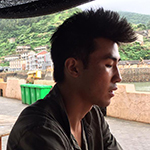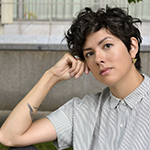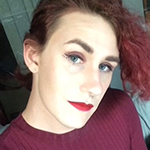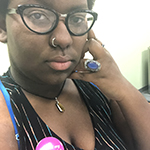An ABC In Question
“why does it always have to be about race? because you made it that way!”
—Danez Smith
You ask me what I eat at home
so I tell you I feed on ghosts
of my ancestors who saved me
all the best pieces. You ask me
what I speak when with
my family so I tell you
battle codes. I tell you paper
boats. I tell you it’s something
you wouldn’t want
to understand. Yet
you keep asking me.
You want to know why
I look like I’m always squinting
and laugh when I respond
it’s because I don’t know
who I can trust. You insist
on tracing your tongue along
my skin in search of something,
anything, you won’t like.
An anxious reminder
your instinct was right.
It doesn’t taste good
but then you can say at least
I tried. You can
close your trusty eyes tonight
certain of their judgement.
And I can close mine
with one still open.
AN ABC AT A BIRTHDAY PARTY
yesterday i spent an hour looking at the census
to see if we really are as small as my teachers
make me feel. even at the birthday party
they insisted on throwing to celebrate
my arrival on this planet, nobody wanted
to be there. there were limp balloons
in all my least favorite colors, envelopes
full of gift cards to stores i never shop at,
no one asked what music i wanted
so the dj played toby keith requests while i sat
in the corner waiting for the cotton-eyed joe
to leave the back of my teeth.
at the end of the night
i stood by the door thanking guests
as they left. halfway through i noticed
my lips were saying i’m sorry instead.
the repetition i demanded must have
triggered it. without any witnesses,
my teachers lined up along
the perimeter to watch me fold
empty chairs and stack them
where they said. we saved you
a piece of cake they hissed.
sarah is bringing the rest back
to her kids. they haven’t eaten
dessert yet. make sure you shut off
all the lights before you pop the balloons.
we’ll leave you a knife and gun to decide
which you want to use. and by the way,
happy birthday. the door shuts.
AN ABC LISTENING TO THE TEACHER LECTURE DURING A CLASS ON MULTICULTURAL ISSUES IN HEALTHCARE
I’m sorry our symptoms / illnesses / accent / voices / echoes / steamed fish / ginger tea / “alternative” medicine / holisticness / wishes for good health and happiness / stories you hear about on NPR / “choices” / ideas about the afterlife / parents / ancestors / money burning / roast pork hanging behind smoke-pressed windows / incense lifting spirits through homes / ways of promising success for our children / pride / guānxi / bravery / survival tactics / bare feet / shaking legs just strong enough to carry what’s left of our veterans after you plunged your Western insecurities through their flail ribs / arms wrapped tight around what still belongs to us / inside jokes / family ashes / badassness / right to health / right to the same freedoms as you / right to be here / existence is a burden during your 8-hour shifts / 40 hours a week. I’m sorry you need a class to unlearn your biases. I’m sorry you make mistakes. I’m sorry my definition of racism didn’t fit any of your four options on the quiz. I’m sorry you’re racist. I’m sorry that I am a homeless thought in your heated home. I’m sorry for admiring your coated shoulders / aweing at your 3 hours scheduled / mandated / morally obligated / disingenuously designed / conveniently set aside every Thursday from nine to noon when class isn’t dismissed early (which it usually is) to consider the wind. I’m sorry it’s cold outside. I wish it didn’t have to be. I really do. I wish it didn’t have to be so fucking cold out here. I’m sorry this is going to hurt me a lot more than it’s going to hurt you. I’m sorry if you can’t accept my apology.

Kyle Liang is a 23-year-old, first-generation-born, Asian American and author of the chapbook, How to Build a House (Swan Scythe Press, 2018). His work has appeared in Stirring, Apogee, Hobart, and elsewhere. He has been nominated for Best of the Net, Best New Poets, and Pushcart. You can find Kyle at Quinnipiac University, falling asleep at his keyboard the night before an exam, or on his website at kyleliang.com.

 BACK TO ISSUE
BACK TO ISSUE







